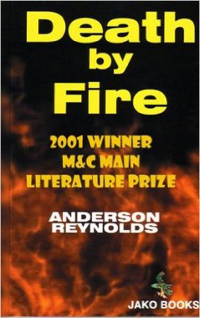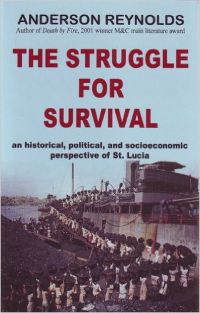Dossier Laméca
Fonds romans Laméca
un guide de lecture en 16 auteurs caribéens

« Michtell had developed the habit of painting light skin women black and then seeing whether they were still beautiful. This was to make sure that he didn’t pronounce a woman beautiful just because she had straight hair and light skin. »
Death by fire, p.159
Présentation de l’auteur
Si la tradition poétique est bien ancrée à Sainte-Lucie avec notamment le prix Nobel Derek Walcott, et d’autres talents tels que Kendel Hippolyte, Vladimir Lucien ou encore John Robert Lee, Anderson Reynolds né en 1958 à Vieux-Fort, enrichit également le paysage littéraire saint-lucien en tant que romancier et essayiste. Bien connu dans son île natale, l’écrivain l’est aussi relativement dans la Caraïbe anglophone. Il a vécu et travaillé une vingtaine d’années aux Etats-Unis, avant de revenir s’installer chez lui et poursuivre l’une de ses passions : l’écriture.
Présentation de l’œuvre
L’œuvre d’Anderson met en perspective une vision du sort inéluctable de Sainte-Lucie sous des abords socio-économiques, historiques, culturels, politiques, religieux et mystiques. Ses écrits proposent un éclairage nouveau sur les zones d’ombre de l’histoire de Sainte-Lucie, car peu les ont mis en exergue selon l’auteur. Parmi ses ouvrages, le roman Death by fire, dont le titre fait référence à l’incendie dévastateur de 1955 dans la ville de Soufrière, a reçu le prix M&C Main literature Prize ; et l’essai The struggle for survival : an historical, political, and socioeconomic perspective of St. Lucia lequel revient sur la grève sanglante des agriculteurs de la banane en 1993.
Sainte-Lucie, une société composite
D’emblée, la coexistence des communautés composant la société de Sainte-Lucie, se pose en termes conflictuels dans son roman Death by fire. Les deux protagonistes subissent les défis que pose le multiculturalisme historique de Sainte-Lucie. Felina d’ascendance africaine, Christine d’ascendance africaine et indienne représentent les anti-héroïnes modernes de l’histoire. Ne s’illustrant ni par leur bravoure, ni par leur abnégation, l’une et l’autre sont au contraire, dépassées par l’avènement d’événements douloureux, jamais surmontés. Ces femmes dont les trajectoires ne s’entrecroisent pas directement, semblent desservies par leur hérédité respective. N’étant dotées d’aucun ressort les poussant à changer le cours de leur vie, leur statut de mère seule les accable au point de les précipiter dans une parentalité défouloir pour l’une et complètement ignorée pour l’autre, comme le révèle cet exemple : “The way she beats the child and always talking bad about his father, I would swear she hates the child. It is as if the child is to blame for his father’s betrayal. She is taking it out on the poor child.” (Death by fire, 15). Leur désarroi conséquent à des histoires familiales lourdes d’exclusion, de décès et autres drames, ne leur apporte aucune réponse salvatrice. D’une génération à l’autre la rémanence des tensions et préjugés entre les communautés, perd néanmoins en intensité, pour laisser place à de nouvelles formes de clivage non plus basées sur l’ascendance, mais sur le fléau de la violence.
La spirale de la violence
La notion de déterminisme social empruntée au philosophe et sociologue français Emile Durkheim reflète la portée politique de ces écrits. Chez Anderson, les personnages semblent voués de façon tragique à des destins impitoyables puisque sous le joug de forces supérieures, qu’il s’agisse de la colonisation, de catastrophes naturelles ou d’éléments mystiques. L’auteur précise ce propos dans son essai : “Because ever since Colombus appeared on the Caribbean scene, the fate of St-Lucia and the other picturesque islands punctuating the Caribbean Sea and separating it from the Atlantic Ocean, had been almost totally dependent on outsiders and events taking place thousands of miles away.” (The struggle for survival, 28)
Dans cette perspective, la misère n’est pas seule responsable du déferlement de violence qui s’abat dans le roman Death by fire. Anderson Reynolds convoque plusieurs paradigmes historiques, socio-économiques, culturels, et mystiques pour évoquer la dérive des enfants de Felina et Christine : Robert et Trevor. Les liens d’amitié unissant les enfants jusqu’à la lisière de l’âge adulte, découlent directement de l’héritage des tares de la société qui les a engendrés. Issus tous deux de foyer monoparental, ils souffrent d’un fort déficit affectif compensé par les actes délictueux qu’ils commettent, et aggravé par l’incapacité de l’entourage adulte à les guider. Afin de masquer leur vulnérabilité originelle, le déferlement de pulsions et d’actes violents, la transgression de lois et règles tacites ou explicites de leur société, deviennent l’unique issue, soulignant la corrélation entre le destin funeste de leur île de Sainte-Lucie et les vicissitudes de ses habitants.
Mots clés
Sainte-Lucie • Etats-Unis • Castries • Vieux-Fort • Enfance • Violence • Catastrophes naturelles • Communauté • Plantation • Occupation • Impérialisme • Guerre mondiale • Foyer monoparental • Incendie • Histoire • Sociologie • Agriculture • Colonialisme • Carnaval • Préjugés raciaux • Grève • Mutation • Pauvreté • Religion • Discrimination • Inde • Afrique
Bibliographie sélective
- Death by fire, Jako Books, 2001.
- The struggle for survival : an historical, political, and socioeconomic perspective of St. Lucia, Jako Books, 2003.
Pour aller plus loin
- www.jakoproductions.com/main.asp?sID=13&page=meet_the_author
Extraits

Two months went by and to the exclusion of everyone else Robert and Trevor had become glued to each other. To Ralph’s great consternation, they had become each other’s shadow. Robert clung to Trevor because of his resemblance to the woman of copper-brown skin and hair to spare whom he wished was his mother, instead of the charcoal-black skin woman with hair too short for fingers to plait who had a hatred of him meant for another. Trevor clung to Robert to make up for the neglect of a mother he adored, a mother born with a love of men, and too occupied with life to bother much with the intricacies of raising a child.
Death by fire, p. 8
So what were you and that douglah boy doing at M&C ?”
“I didn’t go there, Mama, I was playing football all the time.”
She knew full well where he had been. Besides Raph’s report, her neighbor, Coletta, who saw herself as the guardian of the neighborhood, had told her she saw her son and the douglah boy, pockets stuffed with shirley biscuits, being chased by the manager of M&C. But even if no one had told her anything, as soon as she saw the boy’s hand move to his throat, she knew he was lying. Still she wanted to find out what kind of lie the boy would make this time. The lie would help gather her anger, her misplaced hatred.
Boy, don’t I give you breakfast in the morning?”
“Yes, Mama.”
“When school let go for lunch, don’t you find your lunch waiting for your lunch waiting for you on the table?”
“Yes, Mama”
“Do I let you go to bed on an empty belly”
“No, Mama.”
“So tell me, why you had to shame me and go steal the people biscuit ? Didn’t just the other day I cut backside when you stole Mrs. Hutchinson’s pennies? And just the other day you bust a boy’s head with your slate? And you always cursing and kicking your brother, but you treat that douglah boy like a little jesus. So tell me, what I am to do with you ? You want to do me like your father did me? And you are not only a thief, you are a goddamn liar. Bad as it is, I can stand thief, but I just can’t stand a liar. That was what your good for nothing father was? a goddamn liar. Like father, like son. Well, if it is the last thing I will do I’ll get the lying out of you.”
Death by fire, p. 13
“I don’t know, Colleta, I don’t know about him being cursed,” said Cora. “God is not so cruel. That Felina beats the child as if she is possessed. The way she beats the child and always talking bad about his father, I would swear she hates the child. It is as if the child is to blame for his father’s betrayal. She is taking it out on the poor child. What that child needs is caring and the love of Jesus.”
Death by fire, p. 15
“Once, said Coletta, “I tell Felina let’s go to the church. You know what she told me? She said, ‘I and God have no business. What use is God if He is never around when you most need Him. He wasn’t there twenty years ago when the landslide buried alive my father and brothers and sisters, and He didn’t hear my prayers the night, thirteen years ago, my mother died in a pool of coughed-up blood. So tell me, of what use is such a God? No. I finish with God. He and I have no business.’ This was what she told me, word for word. Lord, if I am lying strike me dead.”
Death by fire, p. 16
The gods of land had not saved Christine, their own daughter, from their fire of vengeance. She was among the two-thousand and ninety-three people the fire had made homeless. The homeless daughter of the gods of the land returned and held the stare of the man whom it seemed God had sent to save what was left of the city.
In the years to come Anthony Cummings would not forget the grim face, the ash-sprinkled hair, and the dress that reminded him of a coal mine, but not the pair of lucent eyes that seemed to pronounce him a god. Every time that pair of eyes would penetrate his consciousness, an uneasiness would settle over him.
Death by fire, p. 113
Christine, the child conceived in a crucible of love and passion in which the spirit of Africa joined with India, was no ordinary child. She was born with a love and knowledge of men. This coupled with her matchless beauty continued to baffle people long after she returned to the womb.
Death by fire, p. 115
To find out from whom Christine got her looks, these old people would have had to back two thousand years, when the gods of the land had sent the Caribs to invade the land and kill and drive away the Arawaks. p.119 {…} Still, even without such an intimate knowledge of history if, instead of the gods of Europe, the people were believers of the gods of the lands, they might have guessed that Christine was a child of the gods, and notwithstanding the means and ways, they would have known it was the gods that had imbued her with such beauty. Or, if instead of paying so much homage to the beaches, which spoke of greed, annihilation and slavery, the people had paid more respect to the gods of the land which once provided them with refuge from enslavement and now from touristic contamination, the people would have noticed that Christine had been fashioned after the very image and beauty of the gods.
Death by fire, p. 120
No one could remember when last things were so nice. Some people couldn’t help thinking that someone would do the island a big favor if ever so often, ten years maybe, that someone would burn down Castries. This vexed the gods of the lands exceedingly. Here they were, thinking they had imposed a severe punishment on Castries, yet it seemed they had done Castries a favor.
Death by fire, p. 121
Talking about girls, there is another thing. That afternoon, after we put out the fire, there was a girl no older that sixteen standing in the crowd. Her hair was in disarray and mingled with ashes, coal marks were all over her clothes, and she looked like she had been working all day in a coal mine. Of all the people in the crowd, she looked the most wretched. But strangely, her miserable condition seemed accentuate her beauty. She was just as beautiful as you. I have forgotten her face but the look that were in her eyes, I can never forget. Every time I see you this girl of the fire comes to mind.
Death by fire, p. 168
Crying, Robert began to slowly undress. He was moving too slowly for Felina. She grabbed and pulled him toward her. He struggled to get free. She slapped him into submission and stripped him naked. Then with her whip in hand she dragged him onto the walk path, in full view of the neighborhood. At whatever cost, she was going to exorcise the father out of the son.
The whip cut savagely across Robert’s back. Each lash was an eternity of pain. Amid bawls of pain he begged for mercy.
“Mama, please, I eh go do it again. I promise, Mama, I promise.”
But Felina did not hear his cry.
Death by fire, p. 14
In every one of the years between 1926 and 1939, not only Felina, but the whole island had reason to believe that God had forsaken their land. The sugar industry, the heart and soul of the country, the reason for enslaving a race and for forcing, tricking, kidnapping Indians from India into servitude, was into irreversible decline. And in 1927, in addition to the fire of the gods which had turned the heart of the capital city into ashes and rubble, Panama Disease had wiped out the fledgling banana industry, and withertip and blossom-blight had devastated the lime industry.
Death by fire, p. 49
The family was ashamed. Julita had shamed the manhood of her father and brothers. She had committed an unthinkable crime. She was spoiled, corrupted. Her mother and father couldn’t hold their heads high as they went about Forestierè and as they serve customers in their small merchandise store. They were shamed, but that could be partially remedied. The man responsible would have no choice but to marry their daughter. But then they found out that the father was black. Julita might as well have committed genocide on the family. To be pregnant before marriage was unforgivable, but to sleep with a black man was unthinkable.
Death by fire, p. 57

Now, if farmers had asked historians for advice, they would have been informed that by attempting to decide their own fate they were swimming against the current of history. Because ever since Colombus appeared on the Caribbean scene, the fate of St-Lucia and the other picturesque islands punctuating the Caribbean Sea and separating it from the Atlantic Ocean, had been almost totally dependent on outsiders and events taking place thousands of miles away.
The struggle for Survival, p. 28
______________________________________
SOMMAIRE
 ______________________________________
______________________________________
par Dr Ayelevi Novivor
© Médiathèque Caraïbe / Conseil Départemental de la Guadeloupe, 2017-2018

